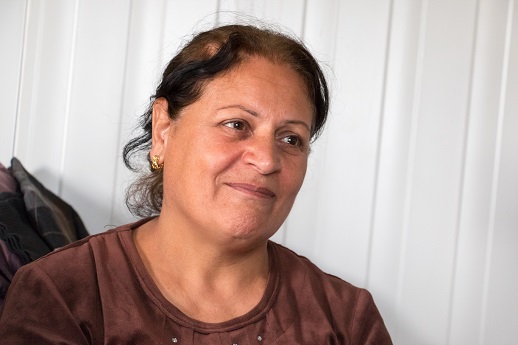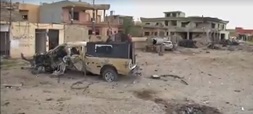
Two years on from Mosul falling to Islamic State, World Watch Monitor hears from Najiba, a woman forced to flee her home on the frontline of fighting between the jihadist group and opposition forces. Tel Skuf – her home town just north of Mosul – was emptied of Christian families shortly after and is still shelled constantly. Her house, like many others, lies in ruin. Thankful that she is safe, Najiba still lives in the portacabin that has been her home for the last two years.
It was raining again in the refugee camp in the agricultural area near Dohuk, a town in northern Iraq about 40 miles away from the fighting*. A young boy tries to sweep the spreading puddles from the yard. Trying to keep dry, the camp inhabitants run towards their portacabins, huddled in their jackets to keep warm. Najiba ushers us inside out of the rain. “Come and drink some hot coffee,” she says with a warm smile.
The cabin isn’t big. Two beds, a tiny kitchen and a separate toilet – that’s all. Najiba lives here with her husband. Her five children are grown up and live elsewhere. While the rain gently taps on the roof of the cabin, we enjoy the coffee Najiba served.
Kitchen
“Our house was beautiful, it was so organized,” Najiba starts off, with a sad smile. “My favourite place was the kitchen. I loved to cook, especially the typical Iraqi dishes. Now there is nothing.” IS entered Tel Skuf early in August 2014. “We were able to leave just before they came,” Najiba tells us. “I was shocked. I just couldn’t believe I had to leave my town.”
Only weeks after Najiba fled, the Kurdish army recovered her town from IS. They found the place ransacked. Najiba shows us pictures of how they found her kitchen. A floral tablecloth is still on the table, and on it there’s an oven dish as if Najiba had just cooked a meal. But around the table everything else lies in ruin – the cabinets are open and dirt covers the floor.
‘At least I don’t have to live in a tent’
Tears well up in Najiba’s eyes: “The kitchen is still there, but the rest of the house is gone. The roof is destroyed and there is just rubble. It was most likely hit by a mortar in the fighting,” she says, her voice trembling. “Now I don’t have a house anymore.”
Najiba’s home wasn’t the only one destroyed or vandalized. Tel Skuf is only three kilometres from Islamic State’s frontline and is used as a base for defending forces. It is hit by mortars almost daily. “There is no electricity, no water, and wild animals wander through the town,” Najiba explains.

Returning is not an option for Najiba, at least not yet. She has her portacabin and monthly food packages, and, although adjusting to refugee life has been hard, she is happy with the help she receives and remains positive. “At least I don’t have to live in a tent. I can lock my door here.”
Najiba, a Christian, says she is thankful to God for what He has been providing. From her portacabin window she can gaze out over a vast valley and imagine that, not far behind the hills, her town is waiting for her. “I hope God will help us to go back to Tel Skuf soon,” she says.
(*Exact location not revealed for security reasons)